This page contains affiliate links. Please read our disclosure for more info.
DAC, the organic grocery store here in Playa del Carmen has an aisle dedicated to dried chiles. They sit in giant tubs with scoops to help yourself. Some are small and blood red, others large and coal black; all are wrinkled, pungent, and equal parts bewildering and enticing. I want to buy them but have no idea which to choose or what to do with them.
We decided to spend an evening learning about Mexican cuisine with Coty at Co.Cos Culinary School. As we made a three course meal together she enlightened us on chiles, salsa, tequila, and more.
The Art of Burning
First up was the number one secret of Mexican cooking: burn things!
This adds lots of flavour and it’s easy too. For our tortilla soup base we just threw onion, garlic and tomatoes into a pan without oil and let them burn. We later used the same technique to make salsa. The roasted vegetables can then be thrown into a blender for a tasty sauce.
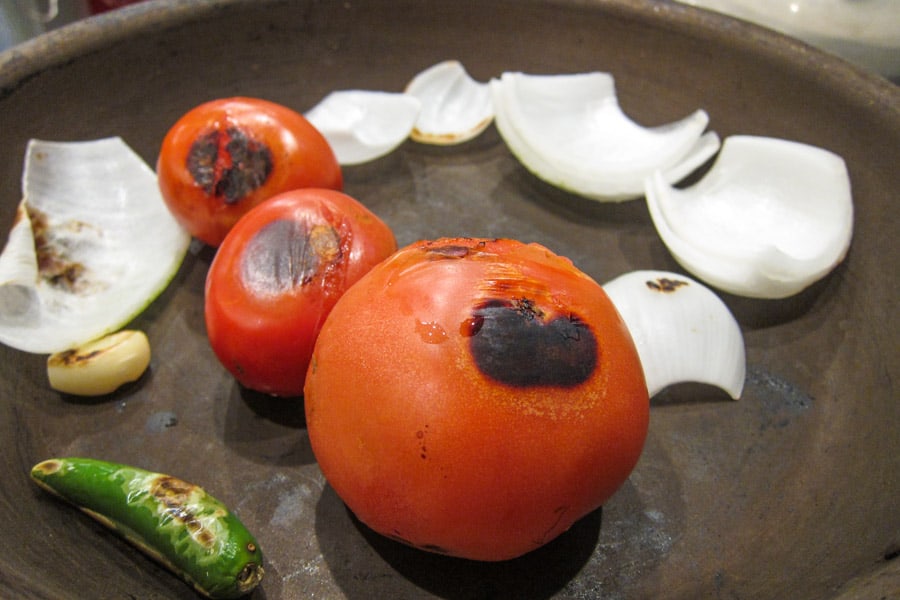
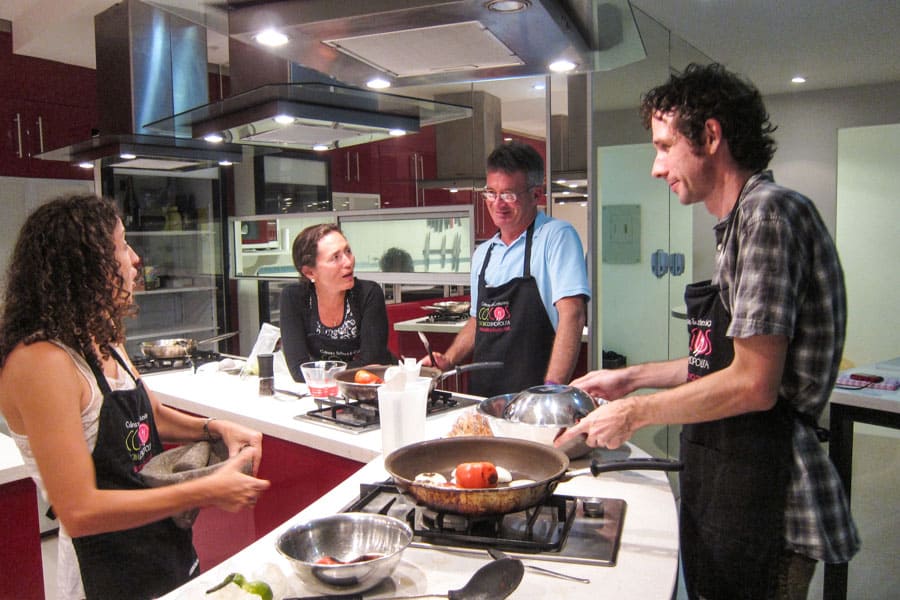
For our chiles rellenos we were stuffing poblano peppers so first we had to peel the skins. In the past I’ve roasted peppers in the oven but Coty taught us a quicker and easier technique: just place them directly on the hob flame, turning until completely blackened. We then let them steam in a covered bowl and it was easy to pull the skins off in a bowl of water.
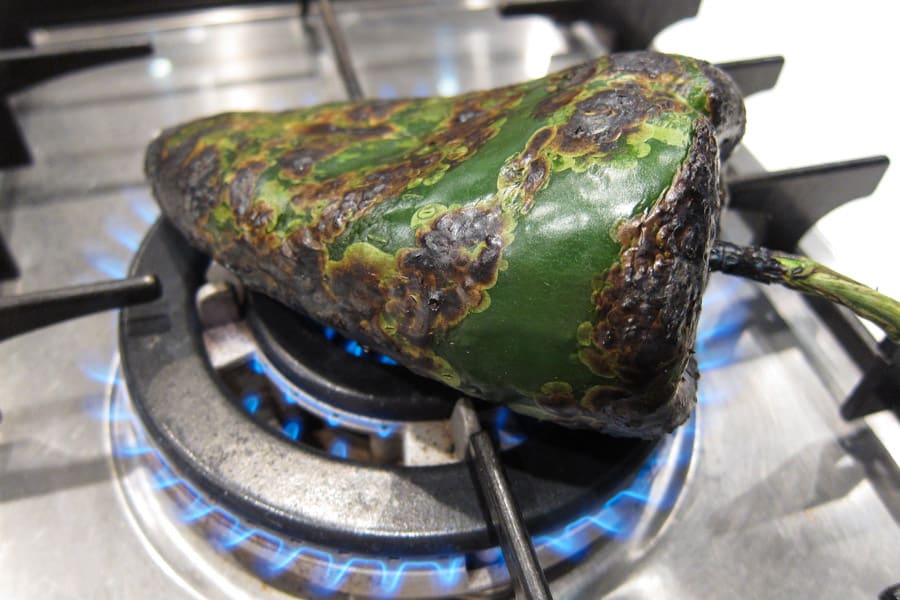
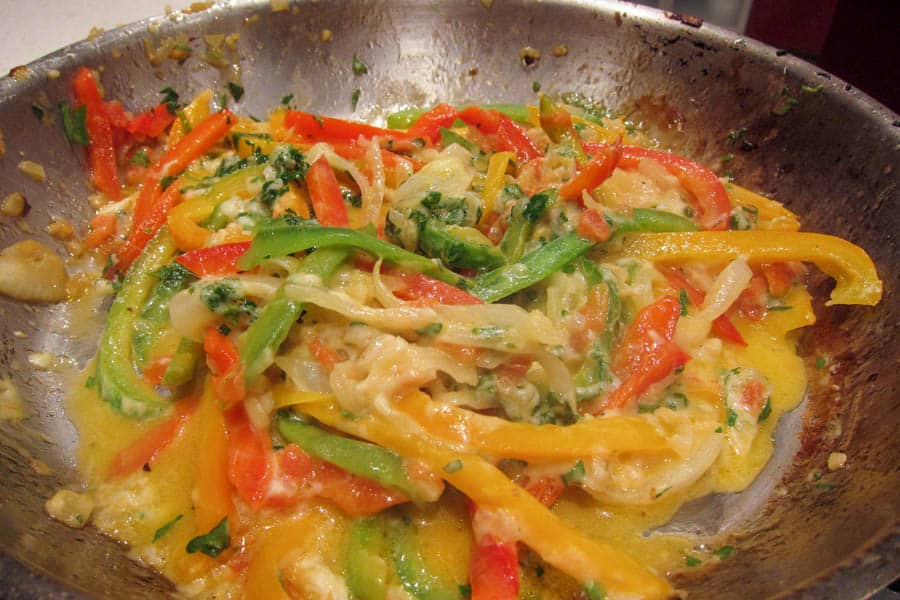
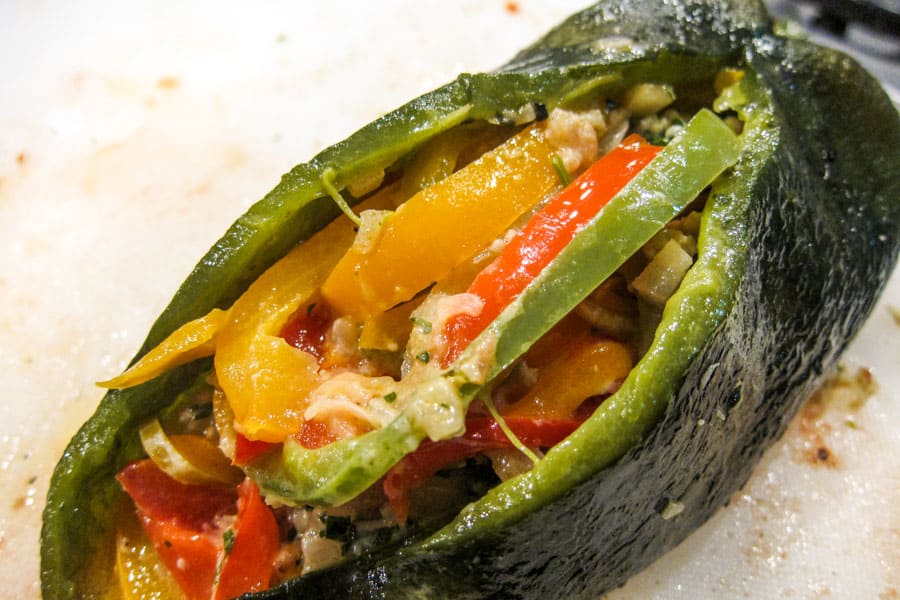
It didn’t stop at burning. We set fire to our dessert.
Simon’s eyes lit up with devilish glee when he heard we’d be flambéing bananas.
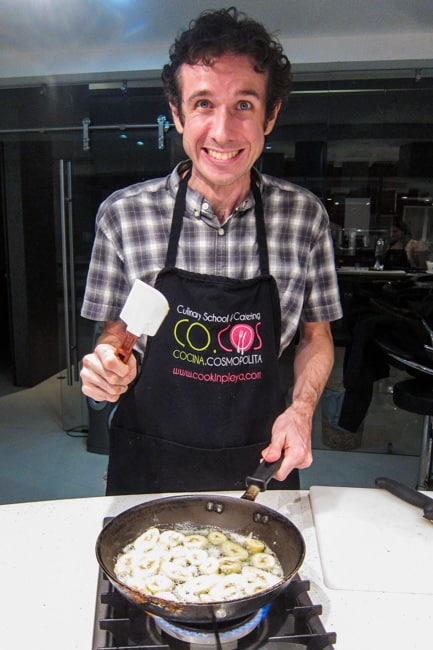
First we got the bananas nicely bronzed (yes, a bit burnt) frying them in butter and sprinkling them with brown sugar. Simon took over for the flambé, adding the brandy while we all stood back, nervously envisaging ourselves leaving without our eyebrows. He tilted the pan so the alcohol ran towards the flame and exploded into a fiery burst of orange. Who knew it’d be so much fun to set bananas on fire?
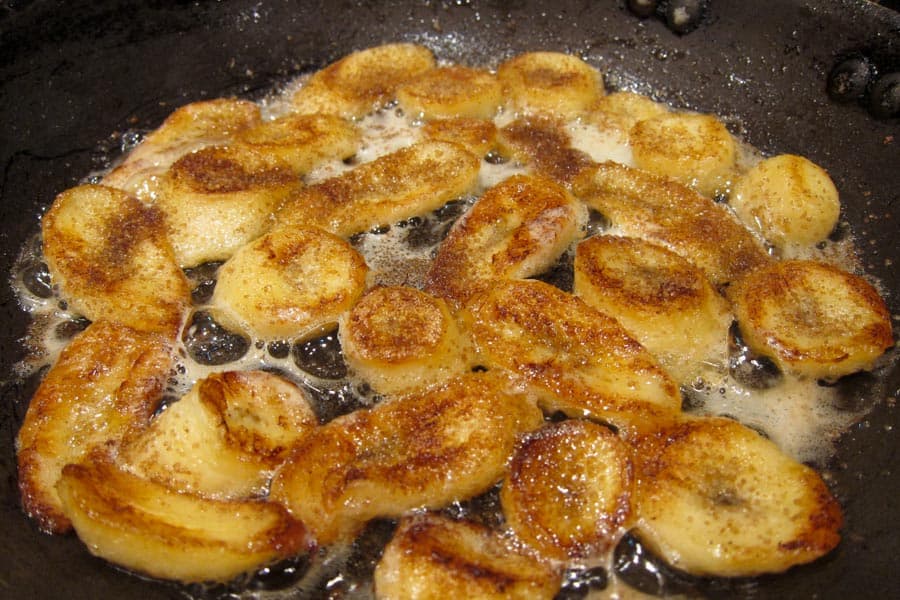
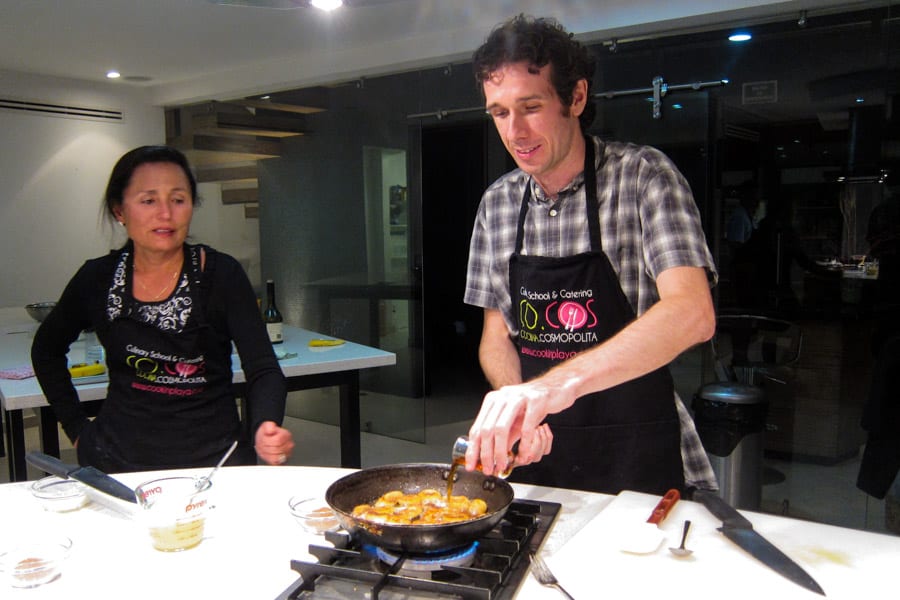
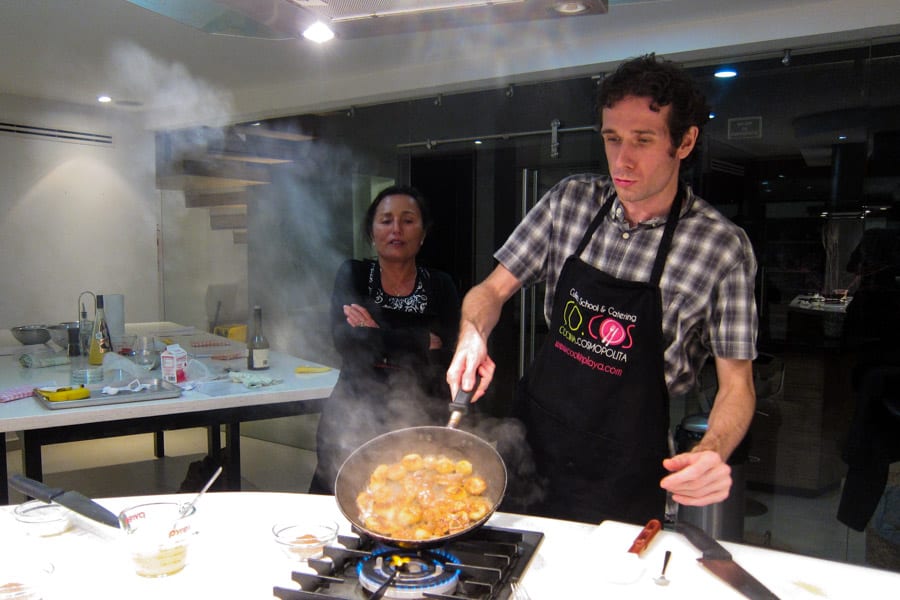
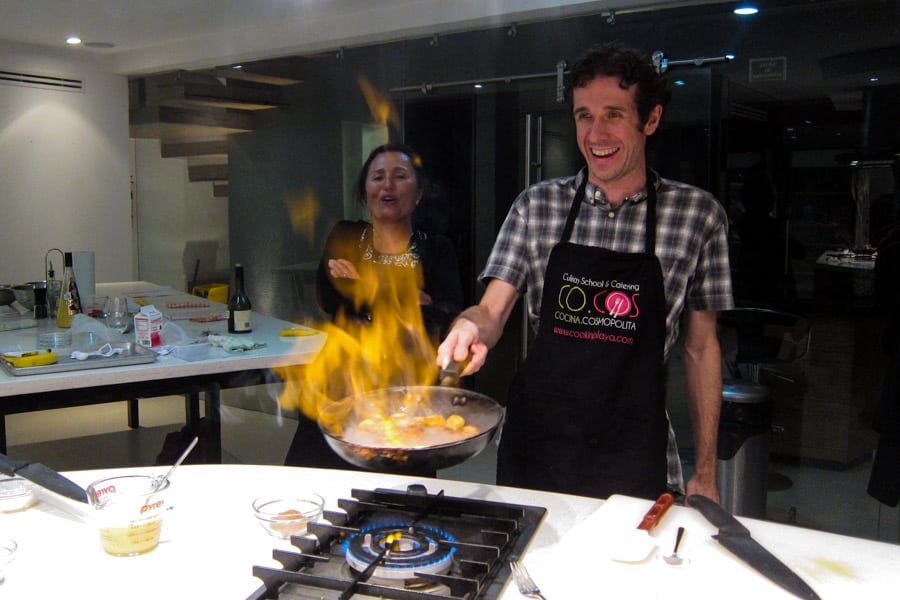
Making Sense of Mexican Chiles
Coty dedicated a whole section of the class to deciphering Mexican chiles, explaining the varieties and uses. Finally I’d know what to do with those shrivelled pods.
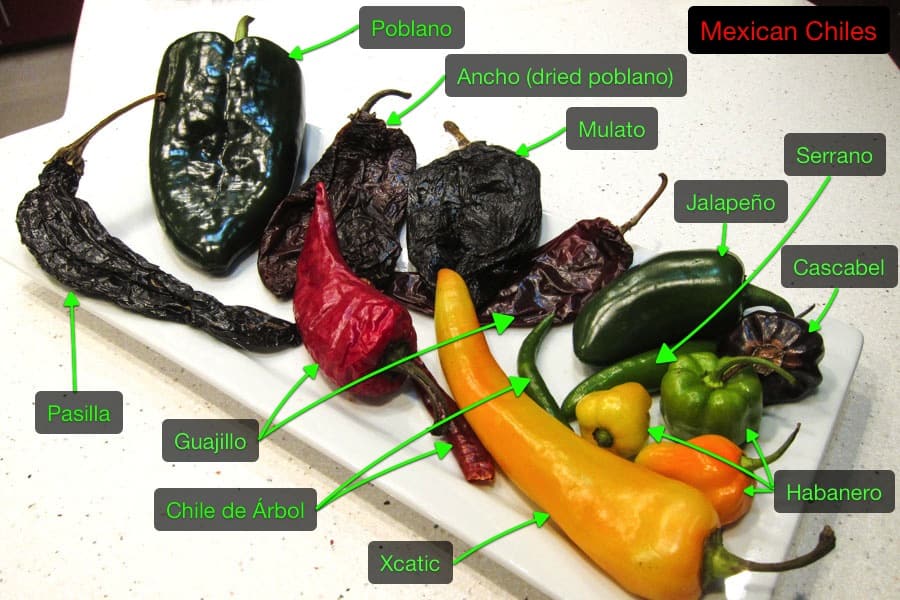
- Poblano – Large, mild green pepper usually roasted and stuffed as we did for chiles rellenos or fried in strips with onion and cream to make rajas—a good vegetarian filling for quesadillas.
- Ancho – Dried poblano. Like most dried chiles they are used for mole, salsa and adobo sauces.
- Pasilla – Long thin dried chile.
- Mulato – Dried chile that looks similar to ancho but is black not red.
- Guajillo – Medium sized red chile. We saw the fresh and dried versions but it’s mostly used dried especially for ajillo, a garlic, guajillo and onion sauce.
- Xcatic – Long, mild, slightly sweet yellow chile. This is the Mayan name and means blond.
- Jalapeño – Medium spicy green chile that’s commonly used.
- Chipotle – Dried jalapeño (not shown in the photo) with a smoky flavour. We had a tasty chipotle dip with our tortilla soup, made by blending chipotles from a can, or rehydrating dried chipotles and blending them with a little water.
- Chile de Árbol – Small, thin spicy chile. The fresh green and dried red versions are pictured here.
- Serrano – Small green chile that’s the workhorse of Mexican chiles. It’s a bit spicier than jalapeño and is used in everything.
- Habanero – Very spicy, small bell-shaped chile that’s native to the Yucatan so here it’s more popular than serrano. In the above photo it’s shown in three different colours as it ripens from green to yellow to orange. It gets a little spicier as it ripens.
- Cascabel – Small round red dried chile that looks similar to habanero but is much less spicy. Its name means rattle because the seeds can be heard when shaken.
Coty encouraged us to experiment with the chiles we use and try substituting dried chiles for fresh in salsa recipes. They can be roasted if making a roasted salsa or rehydrated by soaking in hot water for a boiled salsa.
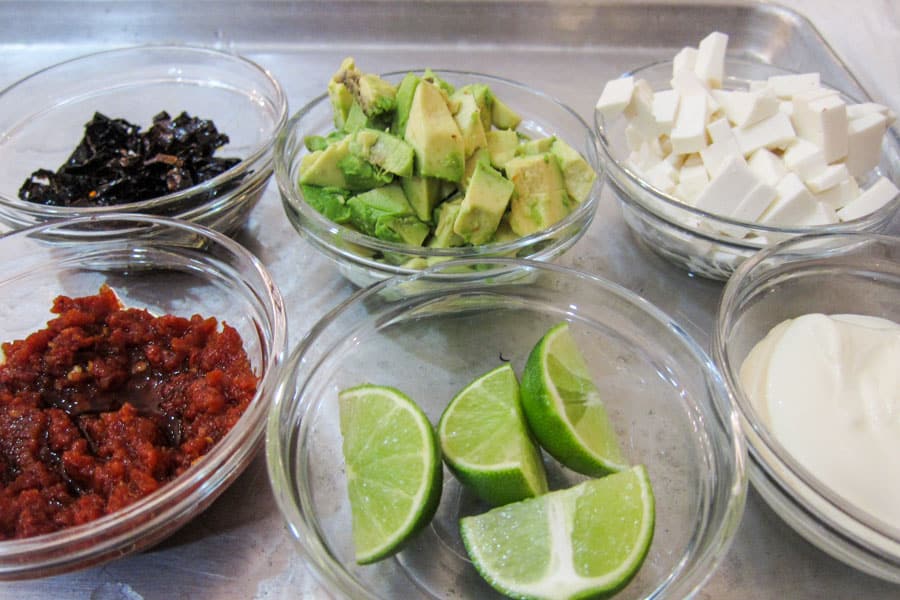
Salsa Secrets
At least two types of salsa are on the table at every Mexican restaurant but we’ve never managed to successfully recreate them ourselves. Coty broke it down for us.
Salsas consist of tomatoes (red or green), onion, garlic, chile (fresh or dried), coriander (cilantro), and salt. Note that the ingredients make up the colours of the Mexican flag.
There are three ways of making salsa in Mexico.
1) Roasting (aka burning!) – A smoky and flavourful method that we used to make the salsa for our chiles rellenos. It’s easily done by dry roasting the ingredients (except the coriander and salt) in a frying pan and then blending. We also experimented with using a pestle and mortar rather than a blender which made a chunkier, milder salsa.
2) Boiling
3) Raw – Coty recommends trying a raw green salsa.
The roast salsa tip was worth doing the class alone. It’s easy to make, wonderfully flavourful, and can be used for everything.
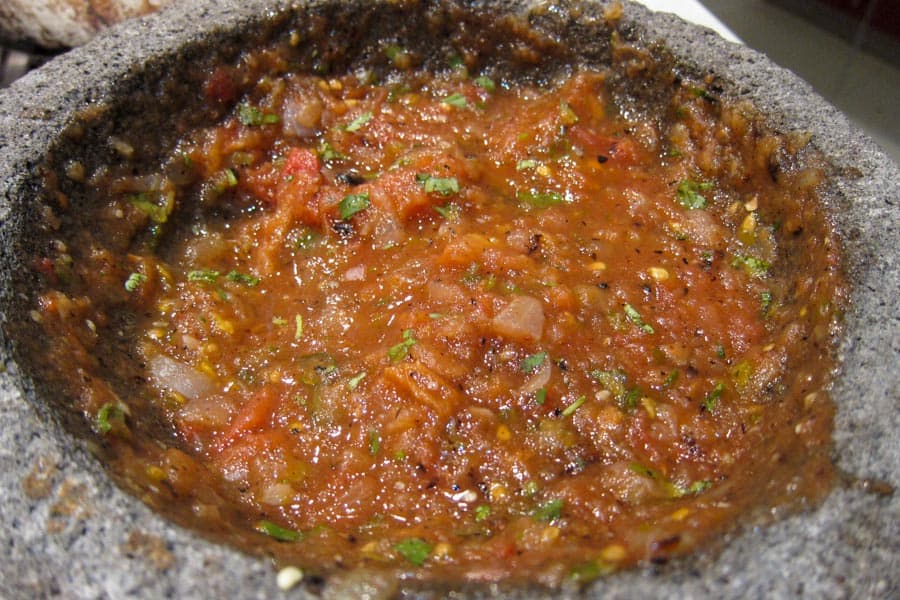
Tequila and Mezcal: What’s the Difference?
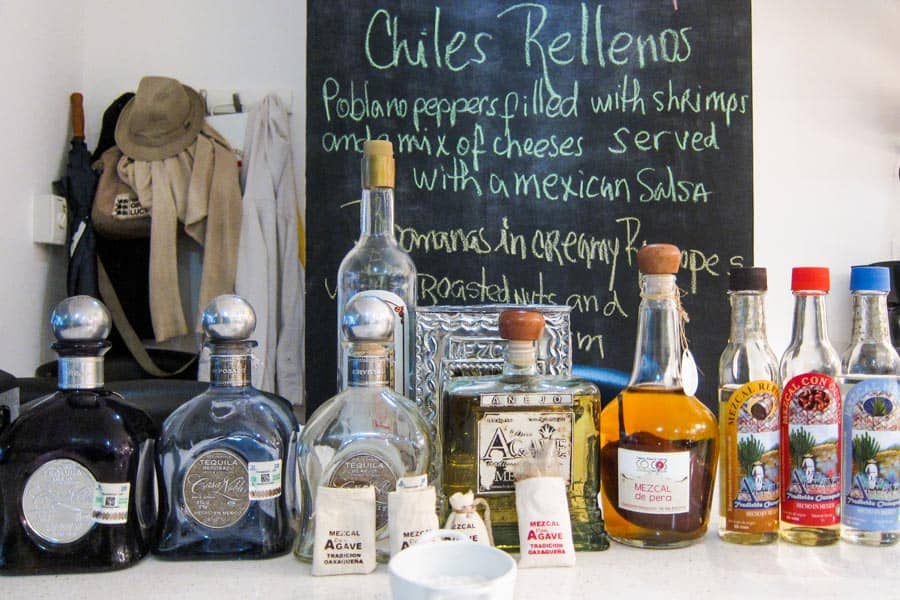
Over dessert Coty sat us down with a line of tequila and mezcal bottles and explained the difference between these Mexican spirits. Both are made from the agave plant which has 30 different varieties, 21 can be used to make mezcal but only one, the blue agave, for tequila. For mezcal the heart of the agave plant is cooked on coals underground which creates a smoky flavour, whereas for tequila it’s steamed.
The worm isn’t used in tequila but it is in mezcal. If the mezcal is “con gusano”, with worm, it means it’s been aged with worms that live inside the plant. One worm is left in the bottle for show. As vegetarians we didn’t try the worm mezcal but just by smell you can tell it has a different, earthier flavour.
We learnt to drink tequila and mezcal the Mexican way. There’s no salt licking and downing a shot glass here—it is sipped and either drunk straight or by sucking the juice from a segment of lime (for tequila) or orange (for mezcal) sprinkled with salt, and mixing the juice with a sip of drink in your mouth.
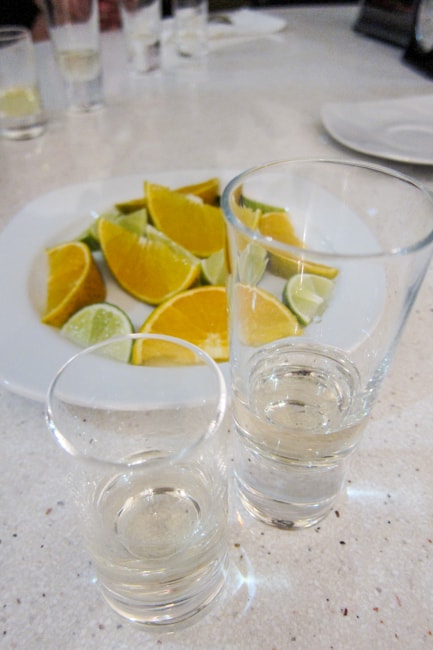
We tried tequila and mezcal reposado which means it’s been aged for less than a year. Sipping them straight led to cringes all around, and adding the lime to the tequila wasn’t much better. The orange, salt and mezcal mix was a lot more manageable.
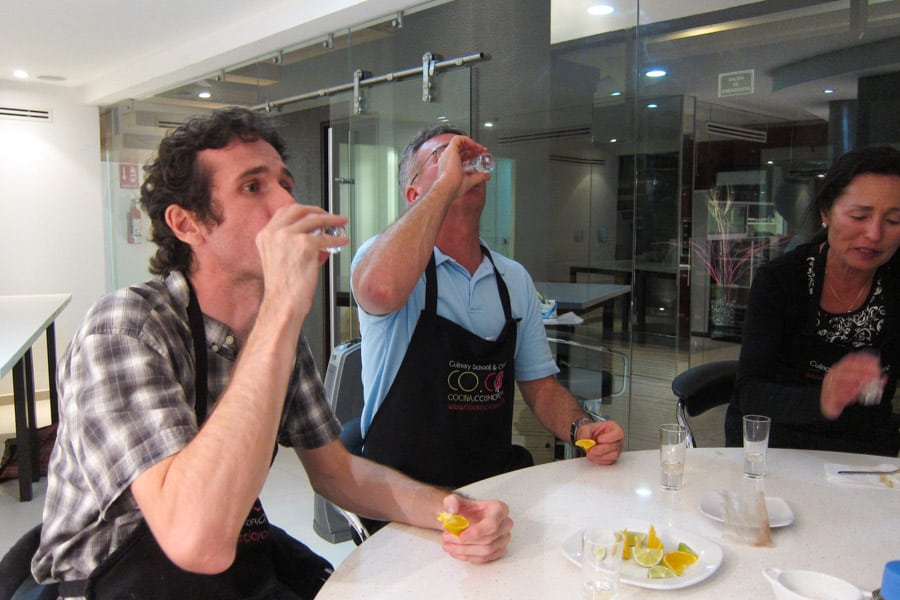
The Results
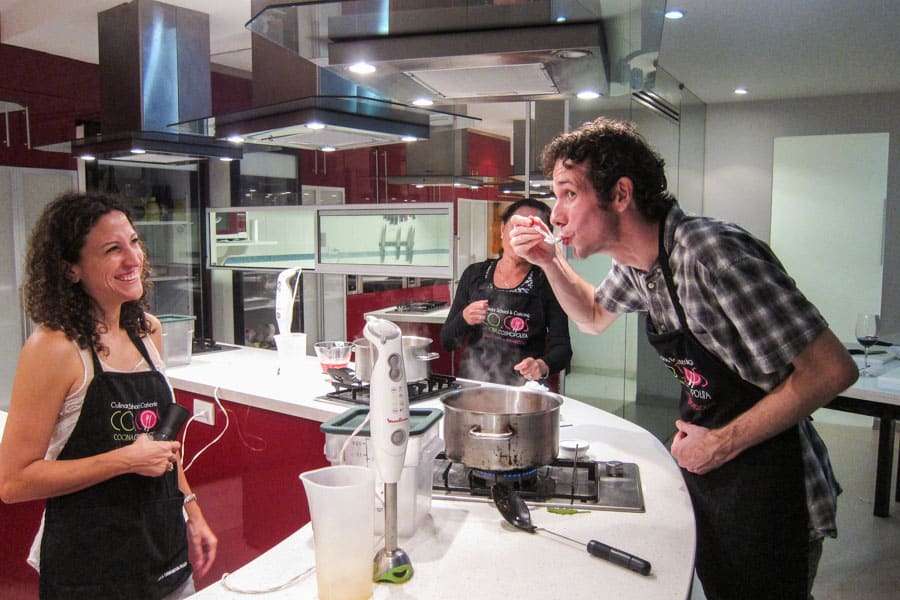
Not only did we learn at lot during the class but at the end we sat down to the best meal we’ve had in Mexico.
Tortilla soup – A simple tomato broth poured over fried tortilla strips and brought to life with a variety of toppings including chipotle dip, fried pasilla chiles, panela cheese, avocado and lime. This is a lighter version of the traditional soup which has a double whammy of fat with tortillas blended into the broth and also added to the final soup.
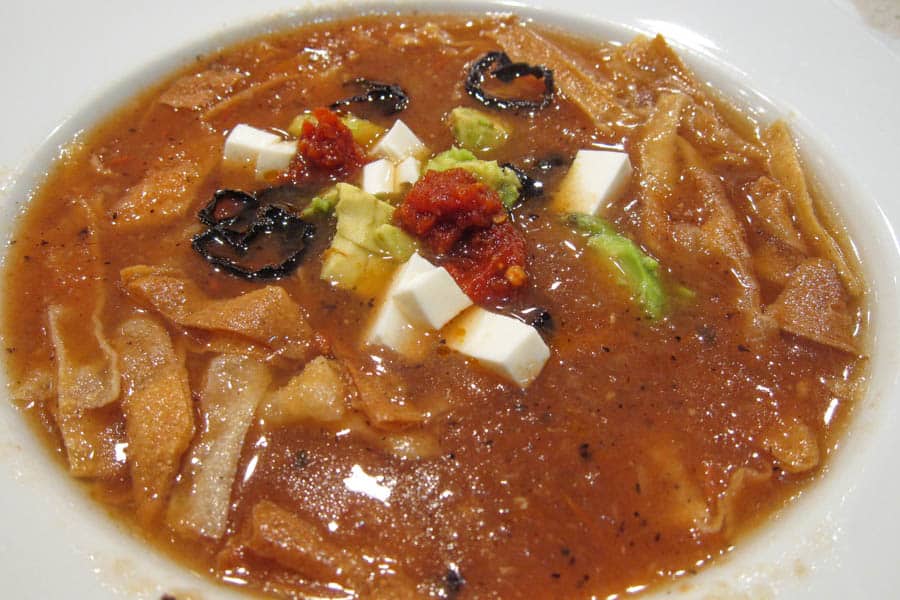
Chiles rellenos – We roasted poblano peppers, stuffed them with cheesy vegetables, coated them in flour and fluffy egg mix and deep fried. Delicious served with roasted red salsa and rice.
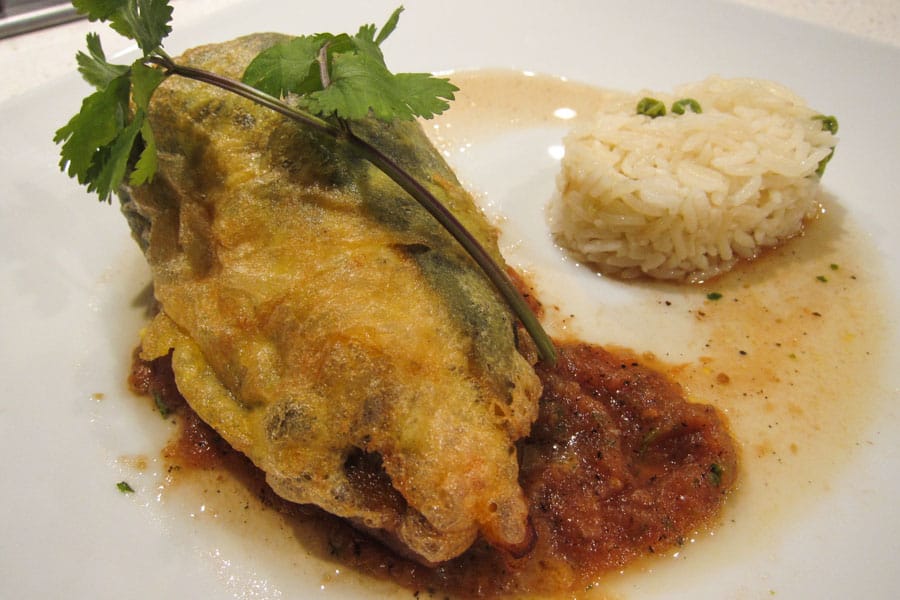
Bananas in Rompope sauce – We flambéed caramelised bananas, added cream and rompope (a creamy Mexican alcoholic drink similar to eggnog) and simmered until it thickened. A simple but decadent and deliciously rich desert that we topped with ice cream and nuts. Heavenly!
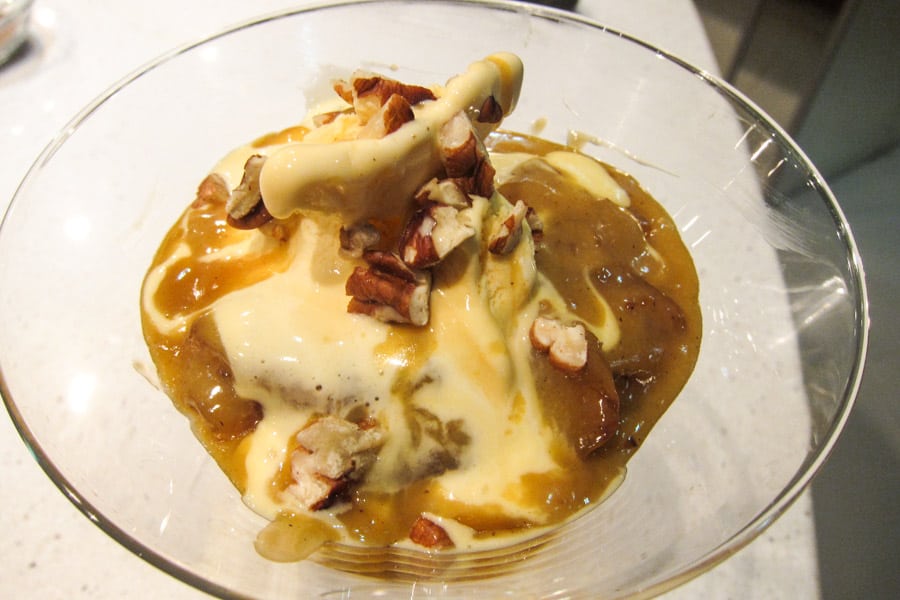
We’ve done many cooking classes around the world and this was definitely one of the best. The stylish glossy red and steel kitchen was a pleasure to work in and had everything we needed; it was a relaxed and fun class with just four of us; and focusing on three dishes meant we weren’t rushed and had plenty of time to chat about all aspects of Mexican food. Coty was happy to answer any questions and we could have easily spent many more hours in her company learning as much as we could.
We love meeting small business owners who are passionate about their trade and value a high quality service over making a profit. Meeting Coty and soaking up her knowledge and enthusiasm left us inspired.
This week we finally took the plunge at the market and our kitchen is now filled with the smoky aroma of chipotle and pasilla. Our Mexican cooking hasn’t looked back.
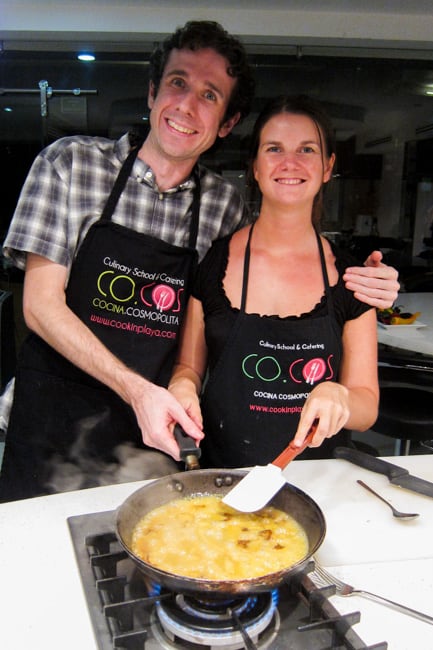
About Co.Cos Culinary School

The three course 4-5 hour class that we took is available for lunch or dinner and costs $115 including wine and beer. There’s also a one course option, a cocktail and appetisers class, and an intensive two week course that we’d love to take. The menu for each class is different and as groups are kept small Coty is open to suggestions about what you’d like to cook, and can cater for dietary requirements as she did for us as vegetarians. See the Co.Cos Culinary School website for more information.
Many thanks to Coty who provided us with a complimentary class.
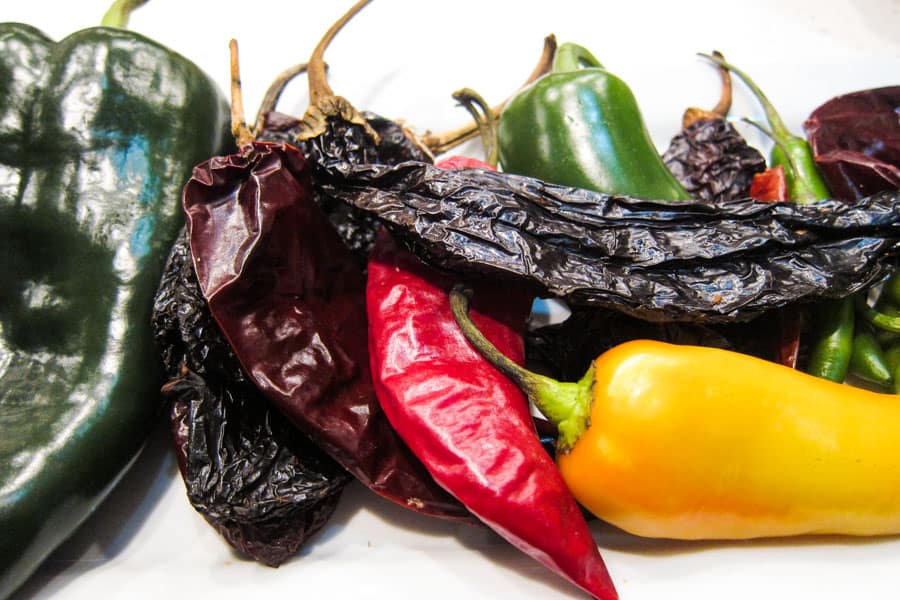
Wouldn’t exactly call DAC an organic grocery store, although they do have some organic offerings. There is Organik Boutique in Playacar and Bionatural on 5ta around 40th, 42nd.
Coty is amazing! When you take a class at Co.co’s you learn so much and the food is always delicioso!
Perhaps not, that’s just how a lot of other people referred to it. Glad you enjoyed the cooking class too.
I am starving after reading this post, and craving Mexican food! Everything looks so good, especially the filling for the Chiles Rellenos. I hope you’ll make tortilla soup and salsa for us next time we meet up somewhere in the world! :)
Of course! I hope it’s not too long before we see you guys again.
I just had lunch, but now I’m… hungry again! Oh dear, it all looks and sounds delicious – I’d nearly say that if you had lost your eyebrows in the great banana flaming, it still would have been worth it;) You describe the cooking class as excellent, and I say you documented it excellently, too – mmmmh!
I would love to do this. Next to Italian and Thai food, Mexican would have to be next. yum!
YUM I’m hungry now! The chilli guide is a great resource as well… i dont think I would be able to tell the difference either
Where is my chicken??!! ;)
Seriously, this all looks great. And your photography really brings it all out. I’m starving and its only 9 am here. Bring me some food!
My mouth is watering! Chile rellenos are one of my absolute favorites and yours looks so delicious! What a great way to spend a day.
I love cooking classes. Those dishes look so yummy and the fact the you get free tequila makes it even more appealing. :-)
OMG this sounds amazing! The Mexican food in Germany is absolutely horrible, so I’ve started making my own salsa, but I’ll have to try the burning trick next time. I’m drooling on my keyboard right now.
Ha ha. Americans always complain about the Mexican food in Europe – you guys are spoilt :) Let us know how you get on with the salsa. We’ve tried it at home a few times now and it’s pretty easy.
That all looks so so good!
It was seriously delicious :)
Chiles rellenos is one of my absolute favorite Mexican dishes, but I’ve always found it so messy & finicky to make at home. Whenever I’ve roasted my poblanos in order to skin them, they end up getting so limp that when it comes to stuffing, battering and frying them, it’s quite the culinary nightmare… this is why I tend to order them when we eat out rather than tackling them at home. It would be lovely learning how to do it the proper way!
The real test is going to be how they turn out when we make them ourselves. It all seemed so easy in the class but we’ll see!
Spending a few months in Playa and so glad I saw this post! The food and location look great Moving to a place with a nice kitchen soon and have been thinking about cooking classes. Will be sharing this with some expat friends around here too.
It’s definitely worth doing a cooking class so you can really take advantage of the kitchen and get creative. If you do take a class say hi to Coty from us and have fun!
hey just got a really late reply notification today. I still plan on going, been resorting to my asian cooking skills and need to learn some local techniques lol. My roommate says she’ll team up with me too and we’ll say hi to Coty.
Congratulations on a beautiful job documenting our evening of culinary adventure with Coty in her Playa Culinary School…the photos are marvelous and certainly will always remind of the savory adventures of that wonderful evening! It was so fun getting to chat with you two about your global travel experiences and we wish you the best along the road ahead in the future. Regards, J and Laura
Thanks J. It wouldn’t have been as much fun without you guys. It was lovely to meet you and good luck trying the recipes back home!